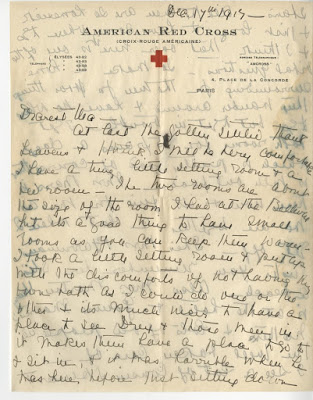This week marked the second Veteran’s Day/ Remembrance Day within the observance of the First World War centennial. The Rosenbach doesn’t have an extensive collection of World War I materials, but one interesting cache of documents comes from Christine Biddle and arrived at the Rosenbach as part of the larger Rush-Williams-Biddle papers in 1976.
Philadelphian Christine Biddle (b. 1882) was the great-great-granddaughter of founding father Benjamin Rush and the granddaughter of Alexander Biddle, whose Civil War letters are shared on our Civil War site. In 1917, Christine went to France to volunteer for the Red Cross. She initially served as a secretary in their Paris office.
During her time away, Biddle wrote frequently to her mother; this letter from December 17, 1917 is the first from France in our collection.
 |
| Christine A. Biddle, autograph letter signed to Anne McKennan Biddle. 17 December 1917. Rush IV:33:08. Rosenbach. |
After filling in her mother on her lodgings, she assured her that “I adore my work. I went all over the American Ambulance Hospital yesterday at Neuilly. I took an American soldier out to have his lungs examined as he’d been at the front & had a frightful cough which he’d had for two months. I do more work on the side & really accomplish quite a lot. I certainly am glad I came over for I think I’m doing some good.”
Biddle found life in Paris thrilling and even described the air raids as exciting. In her first type-written letter (shown below) she explained, “We had another air raid scare last night the guns were all firing and you never saw such excitement. All the people flew to the cellar but I would not go as I said I would prefer to be killed in my room than have the hotel fall in on me, any way I like to go out in the streets and watch the excitement. It is the most thrilling thing you can imagine. The french aviators have been so wonderful, they have stopped the Bosh coming three times lately. I don’t understand if the French can do it why can’t the english?”
 |
| Christine A. Biddle, typed letter signed to Anne McKennan Biddle. 18 February 1918. Rush IV:33:10. Rosenbach. |
Biddle’s concerns about being buried under a building were not altogether misplaced. Less than a month later she described the aftermath of another air raid: “I went down to the place where the worst bomb fell, an incendiary bomb. The building was nine stories high, with a deep cave, that people in that neighborhood took to when the air rade [sic] signal was given. There was absolutely nothing left & all the people crushed in the cave….I went with this man who has clearance of the ambulances so I went right through the ropes up to the mass of ruins & saw everything. A shocking sight! You have no idea in America how horrible the Boche really are. A more barbaric cruel race is not conceivable. Their cruelty is beyond belief & you have to be on this side of the water to fully realize it.”
As the months passed she got used to life in a city at war, writing in June that “we had a customary air raid last night, but I’m getting used to them now & they don’t bother you.” But there were some things that were harder to get used to. She described seeing “a wonderful parade, 3000 American troops & lots of French” but “when the regiment passed, I cried. I couldn’t help it seeing the empty files. This was the regiment that had fought at Chateau Thierry & we had so many wounded and killed, just seeing that & [illeg.] they are over here, does something to you, you never can get over.. What a privilege to be able to see all I am seeing & I have only begun to see what I will have to go through before this horrible massacre is ended, but every day I live I am so thankful to be here & do my little part in this horrible war.”
 |
| Christine A. Biddle, autograph letter signed to Anne McKennan Biddle. 3 August 1918. Rush IV:33:16. Rosenbach. |
In July, 1918 she was moved to a high-ranking position at the front. As she told her mother in the letter above, posted from “somewhere in France,” “I go all over the country & have been working with the aviation & balloon service.” She described the work as “fascinating,” although in another letter she added, “I do quite a lot of canteen work on the side for if you aren’t busy every minute you go nearly mad.” In mid-August she wrote, “No one at home can realize what this war is. We are not human beings any more, men are living worse than the animals. Such braveness & such courage it makes one feel as if you could stand any discomforts.”
Christine Biddle soon returned to Paris and eventually returned home after more than a year in France. Her letters preserve a fascinating first-hand glimpse into a war that most American civilians only read about from afar.

